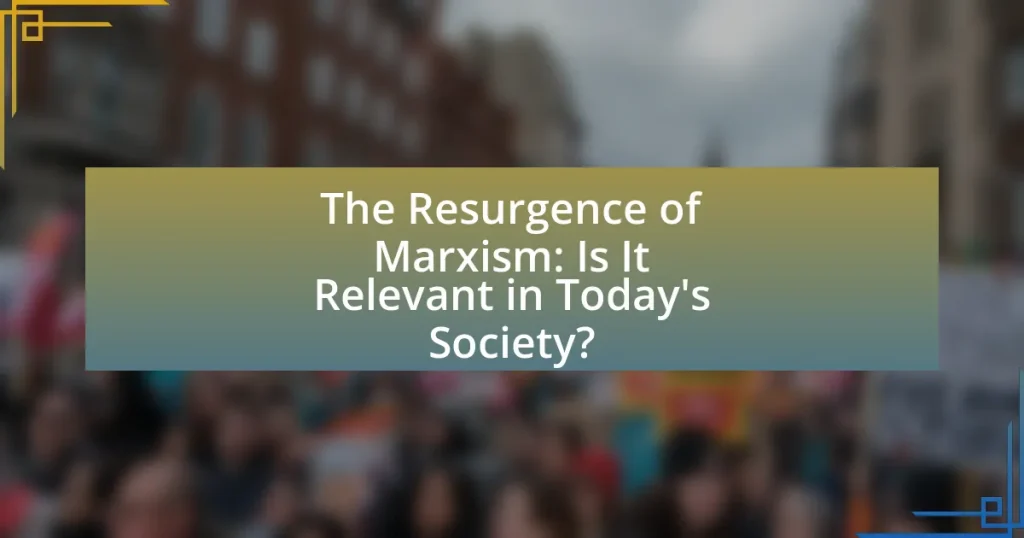The resurgence of Marxism refers to the renewed interest in Marxist theory as a response to contemporary political, economic, and social challenges, particularly in light of increasing economic inequality and the failures of neoliberal policies. Key factors driving this revival include the 2008 financial crisis, the rise of populist movements, and the growing popularity of leftist political parties advocating for socialist policies. The article explores the historical events that have contributed to this resurgence, the key principles of Marxism being revisited, and how these ideas apply to modern social movements. Additionally, it addresses the challenges faced by Marxism today, critiques of its practicality, and the implications for social justice movements, while highlighting the role of grassroots organizations in promoting Marxist thought.

What is the Resurgence of Marxism?
The resurgence of Marxism refers to the renewed interest and application of Marxist theory in contemporary political, economic, and social discourse. This revival has been driven by increasing economic inequality, the failures of neoliberal policies, and the rise of populist movements, which have led many to reconsider Marxist critiques of capitalism. For instance, the 2008 financial crisis and subsequent economic downturn highlighted systemic issues within capitalist frameworks, prompting scholars and activists to explore Marxist solutions. Additionally, the popularity of works by contemporary Marxist theorists, such as David Harvey and Slavoj Žižek, has contributed to this resurgence, demonstrating its relevance in analyzing modern societal challenges.
Why is Marxism experiencing a resurgence in contemporary society?
Marxism is experiencing a resurgence in contemporary society due to increasing economic inequality and discontent with capitalism. The widening wealth gap, where the richest 1% hold more wealth than the bottom 50%, has led many to seek alternative economic models. Additionally, the failures of neoliberal policies, which have dominated global economics since the 1980s, have prompted a reevaluation of Marxist principles that advocate for collective ownership and social welfare. This shift is evident in the rise of leftist political movements and the popularity of socialist ideas among younger generations, as seen in the support for figures like Bernie Sanders and Jeremy Corbyn.
What historical events have contributed to the renewed interest in Marxism?
The renewed interest in Marxism has been significantly influenced by the global financial crisis of 2008, which exposed systemic inequalities and failures within capitalism. This crisis led to widespread unemployment, austerity measures, and growing wealth disparities, prompting many to reconsider Marxist critiques of capitalism. Additionally, the rise of populist movements and increasing social unrest, such as the Occupy Wall Street movement, highlighted issues of economic injustice and class struggle, further fueling interest in Marxist theory. The resurgence of leftist political parties in various countries, advocating for socialist policies, also reflects a growing discontent with neoliberal economic practices, reinforcing the relevance of Marxist ideas in contemporary discourse.
How do current economic conditions influence the resurgence of Marxist thought?
Current economic conditions, characterized by rising inequality and economic instability, significantly influence the resurgence of Marxist thought. The widening wealth gap, where the richest 1% hold more wealth than the bottom 50%, has led to increased discontent among the working class, prompting a reevaluation of capitalist structures. Additionally, economic crises, such as the 2008 financial collapse and the ongoing impacts of the COVID-19 pandemic, have exposed the vulnerabilities of capitalism, leading to a renewed interest in alternative economic models, including Marxism. This resurgence is evident in the growing popularity of socialist policies among younger generations, as seen in political movements advocating for wealth redistribution and workers’ rights, reflecting a shift in public sentiment towards Marxist principles.
What are the key principles of Marxism that are being revisited?
The key principles of Marxism that are being revisited include the critique of capitalism, the concept of class struggle, and the idea of historical materialism. The critique of capitalism emphasizes the inherent inequalities and exploitation within capitalist systems, which many argue are increasingly relevant as wealth disparity grows globally. The concept of class struggle highlights the ongoing conflict between different social classes, particularly the proletariat and bourgeoisie, which is evident in contemporary labor movements and social justice initiatives. Historical materialism, which posits that material conditions and economic factors shape societal structures and ideologies, is being applied to analyze current socio-economic issues, such as globalization and environmental crises. These principles are being revisited as scholars and activists seek to address modern challenges through a Marxist lens, reflecting a renewed interest in Marxist theory in light of current socio-economic conditions.
How do these principles apply to modern social movements?
The principles of Marxism apply to modern social movements by emphasizing class struggle, economic inequality, and collective action. These principles are evident in movements such as Black Lives Matter and the Fight for $15, which address systemic injustices and advocate for the rights of marginalized groups. For instance, the Fight for $15 movement highlights the disparity in wages and working conditions, aligning with Marxist critiques of capitalism that focus on labor exploitation. Additionally, the global climate movement incorporates Marxist ideas by linking environmental degradation to capitalist practices that prioritize profit over people, demonstrating the relevance of Marxist principles in contemporary activism.
What critiques of capitalism are central to the renewed Marxist discourse?
Central critiques of capitalism in the renewed Marxist discourse include the inherent inequality it produces, the commodification of labor, and the environmental degradation associated with capitalist practices. These critiques argue that capitalism leads to a concentration of wealth among a small elite while the majority face economic precarity. For instance, data from the World Inequality Report 2022 indicates that the richest 10% of the global population holds 76% of total wealth, highlighting the disparity that Marxist theorists emphasize. Additionally, the commodification of labor is critiqued for reducing human work to mere economic transactions, undermining the value of human dignity and creativity. Lastly, the environmental critique points to capitalism’s relentless pursuit of profit, which often results in unsustainable practices that contribute to climate change, as evidenced by the Intergovernmental Panel on Climate Change reports detailing the urgent need for systemic change to address environmental crises.
In what ways is Marxism relevant to today’s political landscape?
Marxism remains relevant to today’s political landscape through its critique of capitalism, its focus on class struggle, and its influence on contemporary social movements. The increasing wealth inequality, with the top 1% owning more than half of the world’s wealth, highlights the Marxist analysis of capitalist exploitation. Additionally, the rise of labor movements and calls for workers’ rights reflect Marxist principles advocating for the proletariat against capitalist interests. Furthermore, the resurgence of socialist political parties in various countries, such as the Democratic Socialists of America, indicates a growing acceptance of Marxist ideas in mainstream politics, particularly among younger generations seeking alternatives to neoliberal policies.
How are political parties incorporating Marxist ideas into their platforms?
Political parties are incorporating Marxist ideas into their platforms by advocating for wealth redistribution, social ownership of production, and increased workers’ rights. For instance, several leftist parties in Europe, such as the Podemos party in Spain and the Labour Party in the UK, have integrated policies that emphasize social welfare programs and public ownership of key industries, reflecting Marxist principles. Additionally, the rise of movements like Democratic Socialism in the United States has led to calls for universal healthcare and free education, which align with Marxist critiques of capitalism. These platforms often cite economic inequality statistics, such as the fact that the top 1% of earners hold a disproportionate share of wealth, to justify their Marxist-inspired policies.
What role do grassroots movements play in the resurgence of Marxism?
Grassroots movements play a crucial role in the resurgence of Marxism by mobilizing communities around issues of economic inequality and social justice. These movements often emphasize collective action and solidarity, which align with Marxist principles of class struggle and the critique of capitalism. For instance, the rise of movements like Occupy Wall Street and various labor strikes has highlighted the disparities in wealth and power, echoing Marxist critiques of capitalist exploitation. Additionally, grassroots organizations often provide a platform for marginalized voices, fostering a renewed interest in Marxist theory as a framework for understanding and addressing systemic injustices. This resurgence is evidenced by increased discussions of Marxist ideas in academic and activist circles, reflecting a growing recognition of the relevance of Marxism in contemporary socio-economic contexts.

How does the Resurgence of Marxism manifest in various societies?
The resurgence of Marxism manifests in various societies through increased political movements advocating for socialist policies, growing interest in Marxist theory among academics, and the rise of leftist parties gaining electoral support. For instance, in Latin America, countries like Venezuela and Bolivia have seen governments implementing Marxist-inspired policies aimed at wealth redistribution and social justice. In Europe, leftist parties such as Podemos in Spain and La France Insoumise have gained traction by addressing economic inequality and austerity measures. Additionally, the global youth movement, particularly during events like the 2019 climate strikes, has embraced Marxist critiques of capitalism, emphasizing the need for systemic change to address environmental and social issues. These developments indicate a significant shift in political discourse, reflecting a renewed interest in Marxist ideas as viable alternatives to neoliberal capitalism.
What are the global trends in the adoption of Marxist ideas?
The global trends in the adoption of Marxist ideas indicate a resurgence, particularly among younger generations and in response to economic inequality. In various countries, including the United States and parts of Europe, there has been a notable increase in interest in socialist policies and Marxist theory, driven by dissatisfaction with capitalism’s outcomes, such as wealth disparity and job insecurity. For instance, a 2020 Gallup poll revealed that 43% of Americans aged 18-29 view socialism positively, reflecting a significant shift in attitudes. Additionally, political movements like the Democratic Socialists of America have gained traction, advocating for policies rooted in Marxist principles. This trend is further evidenced by the rise of leftist parties in Latin America, such as in Bolivia and Venezuela, where Marxist ideologies are being integrated into governance as a response to neoliberal policies.
Which countries are leading the way in Marxist revival?
China and Venezuela are leading the way in the Marxist revival. China has embraced a form of socialism with Chinese characteristics, maintaining a one-party state while promoting state capitalism, which has resulted in significant economic growth. Venezuela, under the leadership of Nicolás Maduro, has pursued a socialist agenda, nationalizing key industries and implementing social programs despite facing severe economic challenges. Both countries exemplify a resurgence of Marxist principles in contemporary governance, reflecting a blend of traditional Marxist ideology with local adaptations.
How do cultural factors influence the acceptance of Marxism in different regions?
Cultural factors significantly influence the acceptance of Marxism in different regions by shaping societal values, historical experiences, and economic conditions. For instance, in regions with a strong tradition of collectivism, such as parts of Latin America, Marxism often resonates due to historical struggles against colonialism and inequality, as seen in countries like Cuba and Venezuela. Conversely, in individualistic cultures, such as the United States, Marxism faces resistance due to the emphasis on personal freedom and capitalism, which are deeply ingrained in the national identity. Additionally, the presence of labor movements and social justice initiatives can either bolster or hinder Marxist acceptance, as evidenced by the varying degrees of labor organization in Europe compared to the more fragmented labor landscape in the U.S. These cultural dimensions create a complex interplay that determines how Marxist ideologies are received and adapted in different contexts.
What are the implications of Marxism for social justice movements?
Marxism significantly influences social justice movements by providing a framework for analyzing class struggle and economic inequality. This theoretical foundation emphasizes the need for systemic change to address the exploitation of the working class and marginalized groups. Historical examples, such as the labor movements of the early 20th century, illustrate how Marxist principles have mobilized collective action against oppressive structures, advocating for workers’ rights and equitable distribution of resources. Additionally, contemporary movements, like Black Lives Matter and the Fight for $15, draw on Marxist critiques of capitalism to highlight the intersections of race, class, and economic justice, reinforcing the relevance of Marxism in addressing social inequalities today.
How does Marxism address issues of inequality and oppression?
Marxism addresses issues of inequality and oppression by analyzing the class struggle between the bourgeoisie, who own the means of production, and the proletariat, who sell their labor. This framework posits that economic structures inherently create social hierarchies, leading to exploitation and systemic inequality. Historical evidence, such as the rise of industrial capitalism in the 19th century, illustrates how wealth concentration among capitalists resulted in widespread poverty and disenfranchisement of workers. Marxism advocates for the overthrow of capitalist systems to establish a classless society, thereby eliminating the root causes of oppression and inequality.
What examples exist of successful Marxist-inspired social initiatives?
Successful Marxist-inspired social initiatives include the Cuban healthcare system and the land reform programs in Venezuela. The Cuban healthcare system, established after the 1959 revolution, provides universal access to healthcare, resulting in health outcomes comparable to those of developed nations despite limited resources. In Venezuela, land reform initiatives aimed at redistributing land to peasant cooperatives have sought to empower rural communities and improve food sovereignty, although the long-term sustainability and effectiveness of these programs have faced significant challenges. These examples illustrate the application of Marxist principles in addressing social inequalities and promoting collective welfare.

What challenges does the Resurgence of Marxism face today?
The resurgence of Marxism today faces significant challenges, primarily due to the dominance of neoliberal capitalism and the fragmentation of leftist movements. Neoliberal capitalism, characterized by deregulation, privatization, and a focus on individualism, has created economic systems that often contradict Marxist principles of collective ownership and social equity. Additionally, the left is increasingly divided, with various factions prioritizing different issues such as identity politics, environmentalism, and economic inequality, which complicates unified action. Historical context shows that past attempts to implement Marxist ideas have often resulted in authoritarian regimes, leading to skepticism about its viability. These factors collectively hinder the resurgence of Marxism in contemporary society.
What criticisms are levied against the resurgence of Marxism?
Critics of the resurgence of Marxism argue that its principles are outdated and fail to address contemporary economic realities. They contend that Marxist theory does not adequately account for the complexities of modern capitalism, particularly the role of technology and globalization in shaping labor markets. Additionally, opponents highlight historical failures of Marxist regimes, such as the economic collapse in the Soviet Union and the authoritarianism in various communist states, as evidence that Marxism can lead to oppressive governance rather than equitable societies. Furthermore, critics assert that the focus on class struggle oversimplifies social dynamics, neglecting issues of race, gender, and identity that are crucial in today’s discourse.
How do opponents argue against the practicality of Marxist principles?
Opponents argue against the practicality of Marxist principles by highlighting the historical failures of Marxist-inspired regimes, which often resulted in economic inefficiencies and authoritarian governance. For instance, the Soviet Union’s implementation of Marxism led to widespread shortages, lack of innovation, and ultimately economic collapse, as evidenced by the decline in GDP and living standards during the late 20th century. Additionally, critics assert that Marxist principles overlook human nature, particularly the inherent desire for personal gain and competition, which can drive economic progress. This perspective is supported by economic theories that emphasize the role of incentives in motivating productivity, suggesting that collectivist approaches may stifle individual initiative and lead to suboptimal outcomes.
What historical failures of Marxism are often cited in contemporary debates?
Historical failures of Marxism often cited in contemporary debates include the economic inefficiencies and authoritarian regimes that emerged in Marxist states. For instance, the Soviet Union’s centralized planning led to widespread shortages and a lack of innovation, ultimately contributing to its collapse in 1991. Additionally, the implementation of Marxist principles in countries like China resulted in the Great Leap Forward, which caused a famine resulting in millions of deaths. These examples illustrate the challenges of translating Marxist theory into practice, highlighting issues such as the suppression of political dissent and the failure to achieve the promised classless society.
How do technological advancements impact Marxist theory?
Technological advancements significantly impact Marxist theory by altering the dynamics of production and class relations. The introduction of automation and digital technologies has led to a shift in labor processes, reducing the need for human labor in various sectors, which aligns with Marx’s predictions about the effects of technological progress on labor. For instance, the rise of artificial intelligence and robotics has resulted in job displacement, exacerbating class struggles as the proletariat faces increased unemployment and economic insecurity. This situation reflects Marx’s concept of the “reserve army of labor,” where surplus labor becomes a tool for capitalists to suppress wages and maintain control over the workforce. Additionally, the digital economy has facilitated new forms of exploitation and surveillance, reinforcing Marxist critiques of capitalism’s inherent inequalities.
What role does automation play in the Marxist critique of labor?
Automation plays a critical role in the Marxist critique of labor by exacerbating the alienation of workers and intensifying the contradictions of capitalism. In Marxist theory, automation is seen as a means for capitalists to increase productivity while simultaneously reducing the need for human labor, leading to job displacement and a devaluation of labor power. This process contributes to the concentration of wealth among capital owners, as seen in the rise of technology-driven industries where profits are maximized at the expense of the workforce. Historical examples include the Industrial Revolution, where mechanization led to significant unemployment and worker exploitation, reinforcing Marx’s assertion that technological advancements under capitalism often serve to deepen class divisions rather than liberate labor.
How can Marxism adapt to the digital economy?
Marxism can adapt to the digital economy by analyzing the implications of digital labor and the concentration of capital in tech industries. In the digital economy, the nature of work has shifted towards gig and platform-based labor, which can be examined through Marxist concepts of alienation and exploitation. For instance, the rise of companies like Uber and Amazon illustrates how digital platforms can perpetuate labor exploitation while concentrating wealth among a few owners. Additionally, Marxist theory can address issues of data ownership and surveillance capitalism, emphasizing the need for collective ownership of digital resources to counteract capitalist monopolies. This adaptation is supported by contemporary critiques from scholars like Nick Srnicek, who argue for a post-capitalist framework that incorporates digital labor dynamics.
What practical steps can individuals take to engage with Marxist ideas today?
Individuals can engage with Marxist ideas today by studying foundational texts such as “The Communist Manifesto” and “Das Kapital” to understand core concepts. Engaging in discussions and debates within community groups or online forums focused on Marxist theory allows for the exchange of ideas and perspectives. Participating in local labor movements or social justice initiatives can also provide practical applications of Marxist principles, emphasizing collective action and solidarity. Additionally, attending lectures, workshops, or reading groups dedicated to Marxist thought can deepen understanding and foster critical analysis of contemporary issues through a Marxist lens. These steps are supported by the ongoing relevance of Marxist critiques of capitalism, as evidenced by rising economic inequality and labor unrest globally, which reflect themes central to Marxist analysis.
How can one participate in local Marxist organizations or discussions?
To participate in local Marxist organizations or discussions, individuals can start by researching and identifying existing groups in their area, such as socialist parties, community organizations, or study groups focused on Marxist theory. Engaging with these groups often involves attending meetings, participating in events, and contributing to discussions on Marxist principles and contemporary issues. Many organizations also have online platforms or social media pages where interested individuals can connect and stay informed about upcoming activities. This approach is supported by the increasing number of grassroots movements and community initiatives that emphasize Marxist ideas, reflecting a growing interest in alternative economic and social systems.
What resources are available for learning about Marxism in a modern context?
Resources for learning about Marxism in a modern context include academic texts, online courses, podcasts, and documentaries. Key texts such as “Capital in the Twenty-First Century” by Thomas Piketty and “The Communist Manifesto” by Karl Marx provide foundational insights. Online platforms like Coursera and edX offer courses on Marxist theory and its applications today. Podcasts such as “The Dig” and “Marxism 101” discuss contemporary issues through a Marxist lens. Documentaries like “The Young Karl Marx” and “Marx Reloaded” explore Marxist ideas and their relevance in current socio-economic discussions. These resources collectively enhance understanding of Marxism’s impact and relevance in today’s society.















